
Revista Matematica Complutense
Scope & Guideline
Fostering Innovation in the World of Mathematics
Introduction
Aims and Scopes
- Fundamental and Applied Analysis:
The journal covers a broad range of topics in analysis, including functional analysis, non-linear analysis, and variational problems, emphasizing both theoretical frameworks and practical applications. - Algebra and Geometry:
Research in algebraic structures, algebraic geometry, and their interrelations is a significant focus, promoting contributions that explore the properties and applications of these mathematical domains. - Differential Equations and Dynamical Systems:
The journal publishes works on ordinary and partial differential equations, including boundary value problems, stability analysis, and dynamical systems, reflecting its commitment to understanding complex mathematical models. - Topology and Geometry:
Papers addressing topological spaces, geometric structures, and their applications in various mathematical fields are prominently featured, highlighting the journal's interest in foundational mathematical concepts. - Probability and Stochastic Processes:
Contributions related to probability theory, stochastic processes, and their applications in mathematical modeling are included, showcasing the journal's engagement with statistical methods and their implications. - Mathematical Physics:
Research at the intersection of mathematics and physics, particularly in areas such as quantum mechanics and relativity, is a unique aspect of the journal, facilitating interdisciplinary dialogue.
Trending and Emerging
- Nonlinear Analysis and Partial Differential Equations:
Recent publications indicate a growing interest in nonlinear phenomena and their implications in partial differential equations, reflecting the complexity of real-world applications. - Fractional Calculus and Nonlocal Problems:
There is an increasing number of papers addressing fractional calculus, suggesting a rising recognition of its importance in various mathematical and physical contexts, particularly in modeling processes with memory. - Mathematical Aspects of Machine Learning and Data Science:
Emerging themes related to the mathematical foundations of machine learning and data analysis are becoming more prominent, indicating a trend towards integrating mathematics with computational methods. - Geometric Analysis and Topological Methods:
Papers exploring the interplay between geometry and analysis, particularly in the context of manifold theory and metric spaces, are trending, highlighting a renewed focus on geometric structures. - Algebraic Structures and Their Applications:
An uptick in research related to advanced algebraic structures, such as Lie algebras and modules, suggests an expanding interest in their theoretical developments and practical applications.
Declining or Waning
- Classical Geometry:
There has been a noticeable decrease in papers focusing on classical geometric topics, such as Euclidean geometry or traditional geometric constructions, suggesting a shift towards more abstract or applied geometric studies. - Elementary Number Theory:
Research related to elementary number theory appears to be less prominent in recent volumes, possibly indicating a trend towards more complex or computational approaches to number theory. - Purely Theoretical Mathematics:
Papers that focus solely on abstract theoretical constructs without any applied context seem to be waning, as the journal increasingly favors works that demonstrate practical implications or connections to other disciplines. - Graph Theory:
Although still relevant, the frequency of publications specifically dedicated to classical graph theory seems to be declining, suggesting a possible transition towards more applied graph-related research in areas like network theory. - Historical Mathematical Studies:
There appears to be a reduced emphasis on historical analyses of mathematical concepts or figures, indicating a potential shift in focus towards contemporary research and innovations.
Similar Journals

Archivum Mathematicum
Bridging Theory and Practice in MathematicsArchivum Mathematicum is an open-access journal dedicated to the broad spectrum of Mathematics, published by Masaryk University, Faculty of Science in the Czech Republic. Since its inception in 1965, this journal has provided a platform for the dissemination of research and advancements within the mathematical sciences. It spans converged years from 2004 to 2024, ensuring ongoing relevance in a rapidly evolving discipline. Currently categorized in Q4 for 'Mathematics (miscellaneous)' and ranked #316/399 in general mathematics by Scopus, the journal aims to foster a collaborative environment for researchers, practitioners, and students alike, encouraging submissions that contribute to mathematical theory, applications, and education. With its commitment to open access, Archivum Mathematicum is a vital resource for anyone seeking to stay informed about emerging trends and findings in the field.

Forum of Mathematics Sigma
Shaping the future of mathematics through rigorous scholarship.Forum of Mathematics Sigma is a premier open access journal published by Cambridge University Press that has been at the forefront of mathematical research since its inception in 2013. With a strong emphasis on advancing the fields of mathematics, the journal consistently achieves Q1 rankings across multiple categories, including Algebra and Number Theory, Analysis, and Computational Mathematics. This distinction highlights its impact and relevance within the scholarly community. The journal prides itself on providing a platform for innovative research, fostering collaboration among researchers and practitioners across various mathematical disciplines. Open access publication ensures that cutting-edge findings are widely available to readers globally, enhancing the dissemination of knowledge. With an address in the heart of Cambridge, England, Forum of Mathematics Sigma is dedicated to promoting high-quality research and making significant contributions to the development of mathematics.

Matematicki Vesnik
Empowering innovative research in the heart of Serbia.Matematicki Vesnik is a distinguished open-access journal published by the MATH SOC SERBIA-DRUSTVO MATEMATICARA SRBIJE, dedicated to advancing the field of mathematics since its inception. With an ISSN of 0025-5165 and an E-ISSN of 2406-0682, this journal has been a significant platform for disseminating research findings since its establishment in 1993. Hosted in Serbia, it embraces a broad scope of mathematical discourse while achieving a Q3 category ranking in miscellaneous mathematics for 2023. As part of its commitment to fostering scholarly communication, Matematicki Vesnik is accessible to a global audience, promoting high-quality research and innovative ideas within the mathematical community. With converged years from 1999 to 2024 and a Scopus rank of #232 out of 399 in General Mathematics, the journal plays a crucial role in enhancing visibility and impact for researchers, professionals, and students alike in the dynamic landscape of mathematical inquiry.
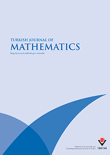
Turkish Journal of Mathematics
Advancing Mathematical Frontiers with Rigorous ResearchTurkish Journal of Mathematics is a prestigious academic publication dedicated to the advancement of mathematical research across a variety of subfields. Established in 1995 and published by the Tubitak Scientific & Technological Research Council Turkey, this journal has built a solid reputation, especially noted for its significant contributions to the field over the years, with its convergence spanning from 1995 to 2002 and again from 2006 to 2024. The journal, which holds a commendable Q2 ranking in Mathematics (miscellaneous) and is positioned in the 66th percentile of Scopus rankings for General Mathematics, aims to disseminate high-quality original research, reviews, and innovative methodologies to advance both theoretical and applied mathematics. Researchers, professionals, and students alike will find invaluable resources within its pages, providing insights that are pivotal for academic and practical applications in mathematics. Although it does not currently offer open access options, the journal remains an essential platform for those looking to engage with the forefront of mathematical inquiry.
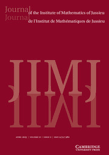
Journal of the Institute of Mathematics of Jussieu
Shaping the Future of Mathematics, One Article at a TimeJournal of the Institute of Mathematics of Jussieu, published by Cambridge University Press, is a leading academic journal that has established itself as a vital resource in the field of mathematics. With an impressive impact factor and a ranking in the top quartile (Q1) of miscellaneous mathematics, the journal serves as a platform for high-quality research from both established scholars and emerging researchers. Spanning from 2002 to 2024, the journal aims to foster collaboration and innovation in the mathematical community by publishing original research articles, reviews, and critical discussions on a wide range of mathematical topics. Although the journal does not offer open access, it remains widely accessible through various academic institutions and libraries, ensuring that critical advancements in mathematics are shared with a global audience. Located in the United Kingdom at the prestigious Cambridge campus, the journal reflects the rigorous standards of its publisher and the rich academic tradition of its home institution.
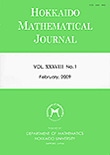
Hokkaido Mathematical Journal
Advancing mathematical frontiers through rigorous research.Hokkaido Mathematical Journal, published by Hokkaido University, Department of Mathematics, stands as a pivotal platform for scholarly discourse in the field of mathematics. Established in 1972, this peer-reviewed journal has consistently contributed to the advancement of mathematical research, covering a wide spectrum of topics within the discipline. With its current ranking in the third quartile (Q3) among miscellaneous mathematics journals, it offers valuable insights and findings that cater to both established researchers and budding mathematicians alike. The journal is accessible through traditional subscription, fostering a community that values rigorous theoretical exploration and applied mathematical methods. As it approaches its convergence year in 2024, Hokkaido Mathematical Journal remains essential for those dedicated to pushing the boundaries of mathematical knowledge and innovation in Japan and beyond.
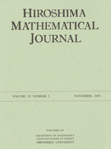
Hiroshima Mathematical Journal
Advancing Mathematical Knowledge Since 1959The Hiroshima Mathematical Journal, published by Hiroshima University, Graduate School of Science, serves as a prominent platform for disseminating high-quality research in the field of mathematics. Established in 1959, the journal has been an integral part of the mathematical community, focusing on areas such as Algebra, Number Theory, Analysis, and Geometry and Topology. Although currently classified in Q4 quartile rankings within its categories, the journal is committed to advancing mathematical knowledge and fostering scholarly dialogue. Its accessibility, combined with its long-standing history, makes it an essential resource for researchers, professionals, and students dedicated to exploring and enhancing the mathematical sciences. For those interested in contributing or accessing cutting-edge research, the Hiroshima Mathematical Journal continues to uphold its mission of excellence in mathematical scholarship.
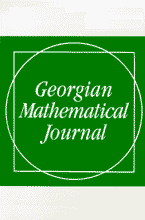
Georgian Mathematical Journal
Fostering innovation in mathematical theory and application.Georgian Mathematical Journal, published by Walter de Gruyter GmbH, is a prestigious academic journal dedicated to the field of mathematics, particularly in its multifaceted applications and theoretical explorations. With an ISSN of 1072-947X and an E-ISSN of 1572-9176, this journal is indexed within notable databases and holds a strong position as evidenced by its Q2 ranking in the Mathematics (miscellaneous) category as of 2023 and a ranking of #140 out of 399 in the general mathematics Scopus category, placing it in the 65th percentile for research visibility. Since its inception in 1994, the journal has continued to evolve, aiming to foster innovative research and scholarly communication among mathematicians worldwide. Although it does not offer Open Access, the journal’s commitment to quality and rigor ensures that published works are of high relevance, appealing to researchers, educators, and students who are dedicated to advancing mathematical knowledge across diverse domains.

JOURNAL OF THE EUROPEAN MATHEMATICAL SOCIETY
Connecting Theoretical Insights with Practical ApplicationsThe JOURNAL OF THE EUROPEAN MATHEMATICAL SOCIETY, published by the EUROPEAN MATHEMATICAL SOCIETY (EMS), stands as a premier platform in the field of mathematics, known for its rigorous editorial standards and impactful contributions to both applied and theoretical aspects of the discipline. With a commendable Q1 ranking in both Applied Mathematics and Miscellaneous Mathematics categories, alongside a Scopus rank of 32 out of 399 in General Mathematics, this journal has established itself as a crucial resource for researchers and professionals. Since achieving Open Access status in 2021, it has expanded its reach, making cutting-edge research more accessible to a global audience. With a publication horizon extending from 2002 to 2024 and a dedicated focus on high-quality mathematical scholarship, the journal continues to foster innovation and collaboration within the mathematical community.
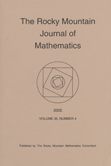
ROCKY MOUNTAIN JOURNAL OF MATHEMATICS
Pioneering Research for a Dynamic Mathematical CommunityROCKY MOUNTAIN JOURNAL OF MATHEMATICS, published by the Rocky Mountain Math Consortium, serves as a critical platform for researchers and practitioners in the field of mathematics since its inception in 1971. With a notable presence in the academic community, this journal covers a broad spectrum of mathematical disciplines, positioning itself in the Q2 category for Mathematics (miscellaneous) as of 2023. Despite being a subscription-based journal, it is recognized for its rigorous peer-review process and contributions to theoretical and applied mathematics, helping to advance knowledge and foster collaboration among mathematicians. The journal's ISSN number is 0035-7596 and its E-ISSN is 1945-3795, reflecting its commitment to accessibility and dissemination of high-quality research. Based in Tempe, Arizona, at Arizona State University, the journal continues to play an important role in shaping contemporary mathematical discourse through well-researched articles and innovative studies, aiming to bridge gaps between various mathematical subfields and engage a diverse audience, including students and established researchers alike.